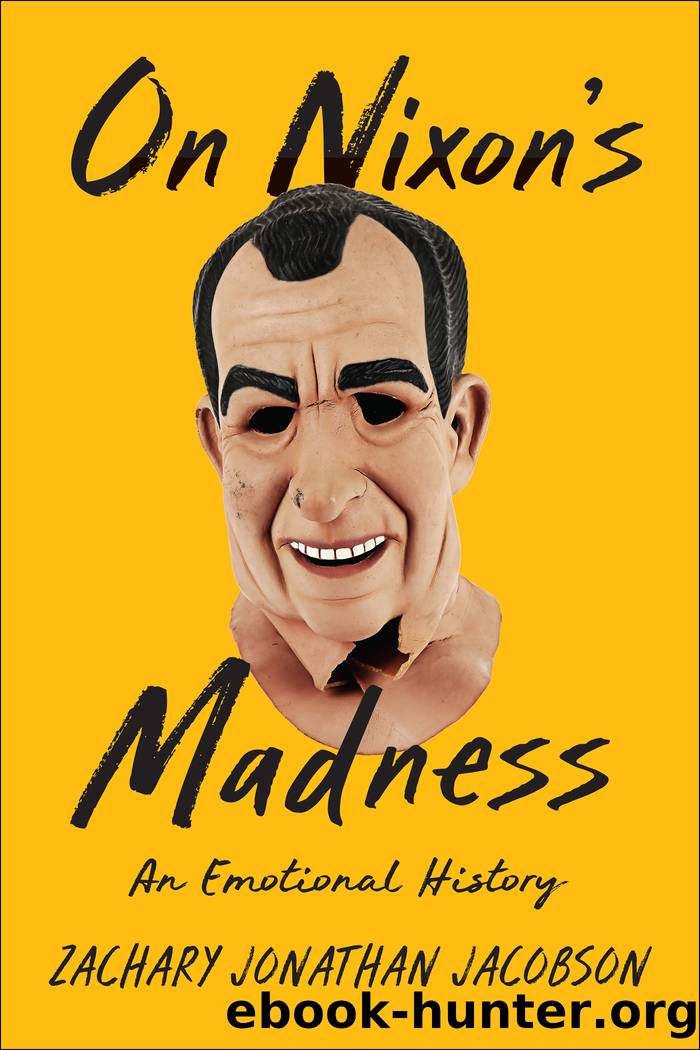On Nixon's Madness by Zachary Jacobson

Author:Zachary Jacobson
Language: eng
Format: epub
Publisher: Johns Hopkins University Press
Published: 2022-06-15T00:00:00+00:00
6 Madness in Play The âMadman Theoryâ in Foreign Policy
THEY SAT IN THE CLUTTER of the national security advisorâs office in the basement of the White House as Henry Kissinger dispatched secret instructions to longtime Nixon counsel Leonard Garment. It was the summer of 1969, just months into Richard Nixonâs first term as president. As part of a cultural exchange, Garment would soon be headed for Moscow to attend an international film festival. Kissinger explained that the visit provided the administration an interesting opportunity. The U.S. press had depicted Garment as a Nixon confidant, as a man the president trusted with his word. No doubt the Soviets would test Garmentâs knowledge as he made the round of delegations. They would be eagerly fishing for information on the newly installed American leader, his policy stances and his personality. Garment was to meet with Georgy Arbatov, a senior advisor to General-Secretary Leonid Brezhnev. âIf the chance comes your way,â Kissinger told Garment, laying out a script, apologize to Arbatov for the presidentâs sometimes erratic behavior, but then tell the Soviets that Nixon had a âdramatically disjointed personality.â Understandably, the president was âmore than a little paranoid because of years of bashingâ by his myriad enemies. Kissinger tasked Garment with relaying that the American president was âwhen necessary, a cold-hearted butcher,â especially toward those who would challenge him to âtests of strength.â Garment should convey that Nixon was a âvisionary,â but, the national security advisor added, he should also suggest that Nixon could get a bit out of control.1
Landing in Moscow in mid-July, Garment met first with the U.S. ambassador, Llewellyn Thompson. The high-level diplomat offered a pair of his best notetakers for Garmentâs meeting with the senior Soviet adviser, yet Garment demurred. He preferred to be more informal, to go alone. That was not possible, the ambassador objected. It was against protocol. The Soviets were tricky. They would have five people in attendance. Would Garment not want to match their numbers? To have a safeguard? âI have my reasons,â Nixonâs counsel insisted. âI go alone or not at all.â2
Garment later expressed surprise at the scheme Kissinger had worked out for him, but he offered no misgivings, no questioning of the ruse as too dangerous, too far-fetched or screwball for Nixonâs liking. Indeed, he relished the chance to conspire. Garment met Arbatov and his coterie at the Moscow Institute for United States Studies. There were not five to the group but, by Garmentâs count, âeight or ten chunky, impressive-looking professionals,â several of whom he judged to be KGB. Introducing himself, Garment quickly related his life story, touching on âmy Russian father, the familyâs struggle out of poverty, working in the dress factory, my religious awakening[,] . . . early interest in socialism, then music.â He sprinkled in some Nixon-like aphorisms: âAll circles can be squared,â and âThere is no such thing as contradiction, only a constrained grasp of complexity.â He spoke of his years of legal work with Nixon and their friendship. At
Download
This site does not store any files on its server. We only index and link to content provided by other sites. Please contact the content providers to delete copyright contents if any and email us, we'll remove relevant links or contents immediately.
The Radium Girls by Kate Moore(10923)
The Templars by Dan Jones(4197)
100 Deadly Skills by Clint Emerson(4089)
Rise and Kill First by Ronen Bergman(4026)
The Doomsday Machine by Daniel Ellsberg(3742)
The Rape of Nanking by Iris Chang(3530)
Killing England by Bill O'Reilly(3466)
Hitler in Los Angeles by Steven J. Ross(3450)
Stalin by Stephen Kotkin(3094)
12 Strong by Doug Stanton(3064)
Hitler's Monsters by Eric Kurlander(2740)
Darkest Hour by Anthony McCarten(2655)
Blood and Sand by Alex Von Tunzelmann(2615)
The Art of War Visualized by Jessica Hagy(2423)
Hitler's Flying Saucers: A Guide to German Flying Discs of the Second World War by Stevens Henry(2305)
The Code Book by Simon Singh(2222)
The Second World Wars by Victor Davis Hanson(2140)
Babylon's Ark by Lawrence Anthony(2077)
Tobruk by Peter Fitzsimons(2068)
